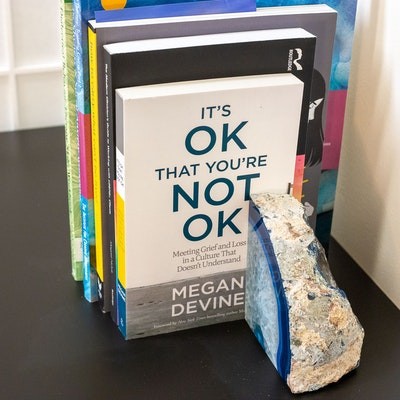Alright – so today we’ve got the honor of introducing you to Lindsay Rosser. We think you’ll enjoy our conversation, we’ve shared it below.
Alright, Lindsay thanks for taking the time to share your stories and insights with us today. We’d love to hear the backstory of how you established your own practice.
I started my own solo therapy private practice as a Licensed Marriage & Family Therapist in 2015. After a few years I started desiring a sense of community and wanted to offer administrative support to therapists. I felt passionate about offering therapists that were feeling restricted an opportunity to explore and discover their authentic professional selves. Over time, I’ve watched the team fill with people who are passionate about learning, eager and willing to do their own work, and truly able to hold a loving and non-judgmental space for clients. We choose to stay small because we value the caliber of passion within our team.
If I had to share one lesson I learned from my journey as a business owner it would be to trust your feelings and instincts– especially during the hiring and interviewing process. As I often discuss with clients, when you leave an interaction feeling especially tired, confused or hesitant (even the slightest bit), there is a reason! Now our process includes me bringing in another team member during interviews. We get to reflect together and affirm that gut instinct. Since changing this process, we’ve grown a team that is a great culture fit and well aligned to our mission and values. We truly feel our team is stronger than ever.


Great, appreciate you sharing that with us. Before we ask you to share more of your insights, can you take a moment to introduce yourself and how you got to where you are today to our readers.
At a young age, I knew I possessed a strong desire to understand and help others. Growing up, I was also exposed to the many stigmas and gaps in the mental health system which left people I cared about feeling damaged and hopeless. As I pursued my education, I realized that there was cutting-edge science that expands our understanding of trauma and can help individuals break the shame around receiving mental health treatment.
Both professionally and personally, I found myself drawn to the biological aspects of psychology– especially the body-mind connection. In my own therapy, I worked with someone trained in Integrative Body Psychotherapy (IBP), which transformed my experience of both myself and my work. I later got trained at their institute in Venice, California. During this time, I was working for the Department of Mental Health serving men and women on the welfare program, CalWorks, and later working primarily with children and families. Due to systemic factors, I wasn’t always able to offer the type of care I knew would be deeply transformative for many clients. That’s when I got inspired to start a private practice.
Today, I run WellBeings, where we focus on helping individuals unpack the complex and nuanced effects of trauma. As a therapist, I’m inspired by the profound changes I get to witness in my clients, and have been on a career-long journey to integrate therapeutic tools from a range of modalities into my own practice. The therapists at WellBeings share this ethic. We partner with clients to help them uproot the deeply held beliefs, emotions, and traumas preventing them from living a fulfilling life.
After some time in business, we recognized that there was a need for lower-cost services for folks who needed to operate outside of insurance. So, we started expanding our team to include graduate student interns and associate level therapists. We’re now able to offer cash-based services at a price point suiting a much broader range of budgets. It’s also been rewarding to offer new therapists the opportunity to be trained in trauma-focused, somatic-oriented therapy. In some ways, this has brought my journey full circle! We’re able to offer people of all income levels access to cutting edge care while also inspiring the next generation of clinicians to keep expanding their knowledge and approach.



Training and knowledge matter of course, but beyond that what do you think matters most in terms of succeeding in your field?
Therapy is both a science and an art. Creativity allows us to effectively navigate the core services we provide, which include the following:
Individualized Approach: First, mental health therapy is not a one-size-fits-all process. Each client has unique experiences, challenges, and needs. Creativity allows therapists to think outside the box and tailor their approach to meet the specific requirements of each client. By creatively adapting therapeutic techniques and interventions, therapists can provide personalized care that resonates with their clients and promotes better outcomes.
Problem Solving: Creativity involves the ability to generate innovative solutions to problems. In therapy, clients often face complex emotional and psychological challenges that require creative problem-solving skills. Therapists who can think creatively and quickly are better equipped to explore alternative perspectives, identify patterns, and help clients discover new ways of understanding and coping with their difficulties.
Engaging Clients & Building Rapport: Creativity can foster engagement and motivation in therapy. Traditional talk therapy may not always resonate with clients who have different learning styles or struggle to express themselves verbally. By incorporating creative techniques such as art therapy, music therapy, or role-playing, therapists can offer alternative avenues for self-expression, exploration, and healing. These creative modalities can help clients connect with their emotions, process traumatic experiences, and develop new insights.
Promoting Resilience and Flexibility: Mental health therapists often encounter situations that require adaptability and flexibility. Creative thinking allows therapists to respond effectively to unexpected challenges, adapt treatment plans to evolving client needs, and find innovative ways to support clients on their journey to recovery. This ability to think creatively can foster resilience in therapists, enabling them to navigate complex therapeutic dynamics and maintain their own well-being.
Any advice for managing a team?
Company culture is incredibly important to me, as it impacts our ability to effectively serve clients. As I’ve navigated my own journey, I’ve found that my leadership strategy is founded on the following pillars:
Clear Communication: I strive to maintain transparent and open communication. I keep my team well-informed about the company’s goals, expectations, and any changes happening.
Lead by Example: As a leader, I aim to display the characteristics I look for in my team. For example, I strive to maintain a positive and optimistic outlook, even during challenging times. I try to show enthusiasm and passion for the work, maintain professionalism, and exhibit a strong work ethic.
Recognize and Appreciate: I acknowledge and appreciate the efforts and accomplishments of my team. I do my best to praise their contributions and strive to help them feel valued and a sense of belonging.
Empower and Delegate: I try to encourage autonomy and empower my team members by giving them ownership of their work. At times, I delegate tasks and projects, allowing them to develop new skills, showcase their abilities, and take on responsibilities such as hosting team meetings and presenting on a topic they feel excited about.
Foster a Supportive Environment: I aim to support a co-creative space that encourages collaboration. I invite feedback about how well things are working or not working and make adjustments accordingly. Additionally, I try to provide opportunities for professional growth and development, such as training and consultation in EMDR Therapy.
Work-Life Balance: I recognize the importance of work-life balance and encourage my team to prioritize their well-being. I offer flexible work arrangements and show understanding and empathy for personal circumstances. I truly care about their overall happiness and fulfillment and check in on what would help them be happier!
Contact Info:
- Website: https://www.wellbeings-therapy.com/
- Instagram: https://www.instagram.com/wellbeingstherapy/?hl=en
- Facebook: https://www.facebook.com/wellbeingstherapy/?ref=page_internal
- Linkedin: https://www.linkedin.com/company/wellbeings-therapy/?viewAsMember=true
- Youtube: https://www.youtube.com/watch?v=DkBk5kcKEnk
Image Credits
Zencare


